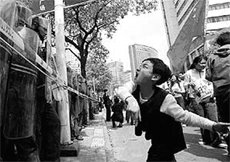Since March 4, a series of anti-Japanese protests has disturbed cities across China. Japan’s bid for a UN Security Council seat sparked the first protests, which grew after Japan approved textbooks that glossed over its wartime aggression. After some observers interpreted the Chinese government’s ignoring of these protests as a tacit approval, the regime issued a statement calling for their end. Diplomatic relations between the two countries are said to be at their lowest point since 1972.
China and Japan have a history of tension, and this crisis formed around the Chinese view that Japan has not adequately apologized for WWII-era aggression and atrocities in China and across Asia.
“Recognition of the history is a wide gap between Japan and China,” third-year and Japanese exchange student Masako Ishii said. She said that many of the textbook complaints relate to word choice, such as substituting the word ‘expansion’ for ‘aggression’.
Ishii went on to explain that the Japanese educational system is based around huge standardized tests, and is not structured to teach the detailed history that Chinese students learn. This leaves many Japanese surprised at historical and continued Chinese anger.
Weeks of public demonstrating had turned, in some cases, into attacks with stones and paint on Japanese embassies and businesses.
“When the Government tolerated – some would say encouraged – a huge anti-Japanese demonstration here that flirted with turning into a riot,” said New York Times opinion columnist Howard W. French, “it bore echoes of the mass manipulation of students of another era, the Cultural Revolution.”
Associate Professor of Political Science George Guo said that the Chinese government encouraged these protests to check Japan’s expanding influence in Asia. He said that Japan wants leadership in the region, and is improving its army and beginning to deploy international troops.
“They want to have another force like a mass movement in China; they want to have some pressure on the Japanese government, but that pressure is dangerous,” Guo said. “If those kinds of street demonstrations grow out of control, the regime probably will lose control.”
Ishii also says that the conflict arises from the governments of both countries, rather than from their population. “Governments control people’s minds,” she said, “but if you really understand people, they don’t feel hatred. I just want a better relationship, without government interfering.”
China has also criticized Japanese Prime Minister Junichiro Koizumi for visiting Yasukuni Shrine in Tokyo, the gravesite of Japanese WWII soldiers, as well as war criminals.
Chinese President Hu Jintao met with the Japanese P.M. at the Asia-Africa Summit in Indonesia on March 23. Both leaders announced, according to The New York Times, their decision “to look beyond disagreements and focus on the future.”
Guo points out that economic interdependence is powerfully pushing the two nations towards a peaceful solution. “Both countries feel it’s vital to be at peace. Japan cannot afford to lose China as a major market.

